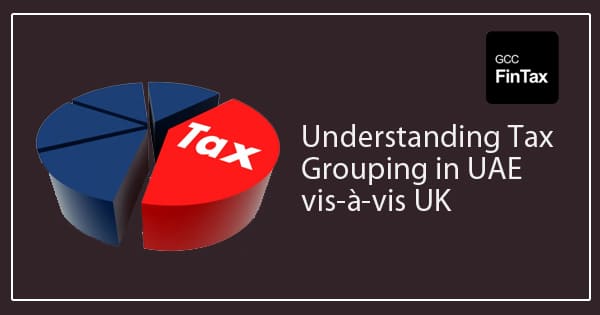
What is Tax Group?
Two or more Persons registered with the Federal Tax Authority in UAE for the Tax purposes as a single taxable person in accordance with the provisions of UAE VAT Law and rules & regulations made the there under from time to time.
What is Tax Group Registration under UAE VAT?
Tax Grouping at UAE
The idea behind a VAT group (or single taxable entity as it is known in EU law) is that two or more persons can be treated as a single entity for VAT purposes. There are two objectives behind this; the first being administrative simplicity, and the second to counter avoidance from artificial splitting of businesses.
In the UK we think of VAT groups only in terms of groups of companies, and in fact the UK rules currently only allow incorporated entities to form a VAT group. However, the UK has made use of the wider EU single taxable person principle in other areas such as to prevent avoidance through business splitting (VATA 1994, Sch1, para 1A and 2), to treat partners in a partnership as a single taxable entity (VATA 1994, s45), and also to treat associations as a taxable body (VATA 1994, s46(3)).
To be treated as a single taxable entity, the EU legislation says that the persons must be closely bound by financial, economic and organizational links (Principal VAT Directive, Article 11). In the UK we use the rules found in the Companies Act to determine the eligibility of companies to join a group. What the UK has historically done is to treat control as a proxy for the three EU requirements, except that it has recognized that control is not always a valid test. For instance, to counter certain abuses, it requires other tests to be applied (see the Value Added Tax (Groups: Eligibility) Order SI 2004/1931 as an example).
Thus, the current rule may be summarised as if there is control there is a presumption of the three criteria being met unless the contrary rules provide otherwise.
The consultation
HMRC accept that, following the cases of Larentia (C-108/14) and Minerva and Marenave (C-109/14), a Member State may not restrict VAT grouping to those entities which have legal personality (for example incorporated companies), unless it is justified by the prevention of abusive practices, tax evasion or avoidance. Therefore, VAT grouping could be extended to natural and other non-legal persons.
This would mean, for example, that a sole trader could also VAT group with a company which he owns, or that an unincorporated charity could VAT group with its trading subsidiary. The possibilities are considerable.
The difficulty lies, therefore, in how to decide how the three criteria (financial, economic and organisational links) are met. HMRC are consulting upon the eligibility criteria, and we would like to hear from members about this. For example, could the criteria be based on the factors that create a partnership? A partnership comprises persons carrying on business together by agreement.
The consultation is also seeking views on the impact of the changes introduced by the UK following the Skandia (C-7/13) judgment, and whether there are any other CJEU decisions that have had a financial or operational impact on UK VAT groups.
Finally, the consultation seeks views on the interaction of the VAT cost sharing exemption (VATA 1994 Sch 9, Group 16) with VAT group treatment, particularly in the light of widening the eligibility for VAT grouping. Cost sharing is a particularly important issue because of the increasing moves towards the pooling of resources in the economy, yet the exemption is very tightly drawn, based on EU legislation over 40 years old. We would like to hear what thoughts you have about any business model designed to share resources.
Disclaimer: Content posted is for informational & knowledge sharing purposes only and is not intended to be a substitute for professional advice related to tax, finance or accounting. The view/ interpretation of the publisher is based on the available Law, guidelines, and information. Each reader should take due professional care before you act after reading the contents of that article/ post. No warranty whatsoever is made that any of the articles are accurate and is not intended to provide and should not be relied on for tax or accounting advice.
You can access Law including Guidelines, Cabinet & FTA Decisions, Public Clarifications, Forms, Business Bulletins for all taxes (Vat, Excise, Customs, Corporate Tax, Transfer Pricing) for all GCC Countries in the Law Section of GCC FinTax.